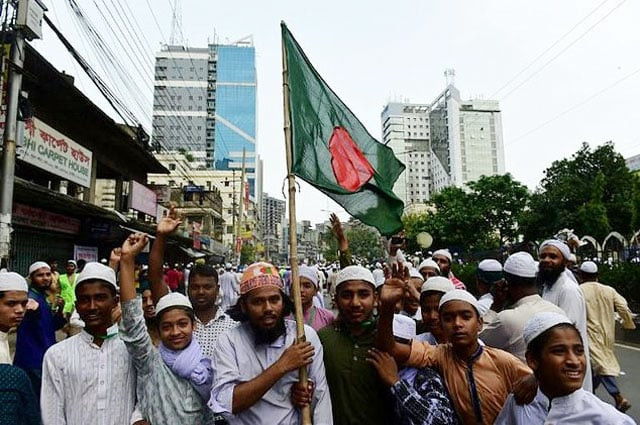Bangladesh removes 'un-Islamic' justice statue from Supreme Court after protests
Work to take down statue in front of the top court in Dhaka was supervised by its sculptor Mrinal Haque

Hardliners have staged massive protests in Dhaka in recent months against what they say is a Greek goddess unbefitting of Bangladesh. PHOTO: AFP
Work to take down the statue, which is less than six months old, in front of the Supreme Court in Dhaka was supervised by its sculptor Mrinal Haque. "This is a slap in the face of progressive people in this country," Haque said, as dozens of young secular activists staged a protest as the statue was removed amid heavy security.
Bangladesh jails high-profile militant leader for seven years
The statue of "lady justice" has ruffled feathers in the Muslim-majority nation, with hardliners staging massive protests in recent months against what they say is a Greek goddess unbefitting of Bangladesh. Protesters wanted the statue of the robe-clad, blindfolded woman holding scales, said to represent justice, destroyed and replaced with a holy Quran, despite Bangladesh's secular constitution.
But the country's Prime Minister Sheikh Hasina, who leads the secular Awami League party, apparently backed the extremists by expressing her dislike for the statue. Hasina, who had kept the furore at arms length, broke her silence last month after inviting top extremist leaders to her residence where she described the statue as ‘ridiculous’.
"I don’t like it myself. It’s being called a Greek statue, but how did a Greek statue get here?" she said. Analysts said Hasina's stand on the statue was part of her efforts to woo the extremists and the country's conservative rural electorates ahead of the general election, expected to be held sometimes next year.
Bangladesh upholds life sentence for prominent JI member
Her policy shift has shocked secular groups, who consider it further evidence of creeping radicalisation as hardline elements push for Bangladeshi society to more closely reflect its Muslim traditions. Conservative Bangladesh has experienced increasing tensions between hardliners and secularists in recent years, suffering a spate of killings of atheist bloggers, religious minorities and foreigners.



















COMMENTS
Comments are moderated and generally will be posted if they are on-topic and not abusive.
For more information, please see our Comments FAQ